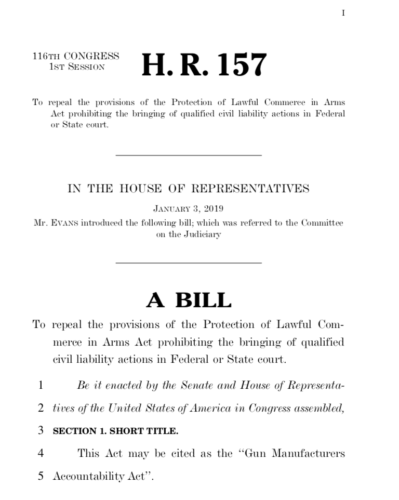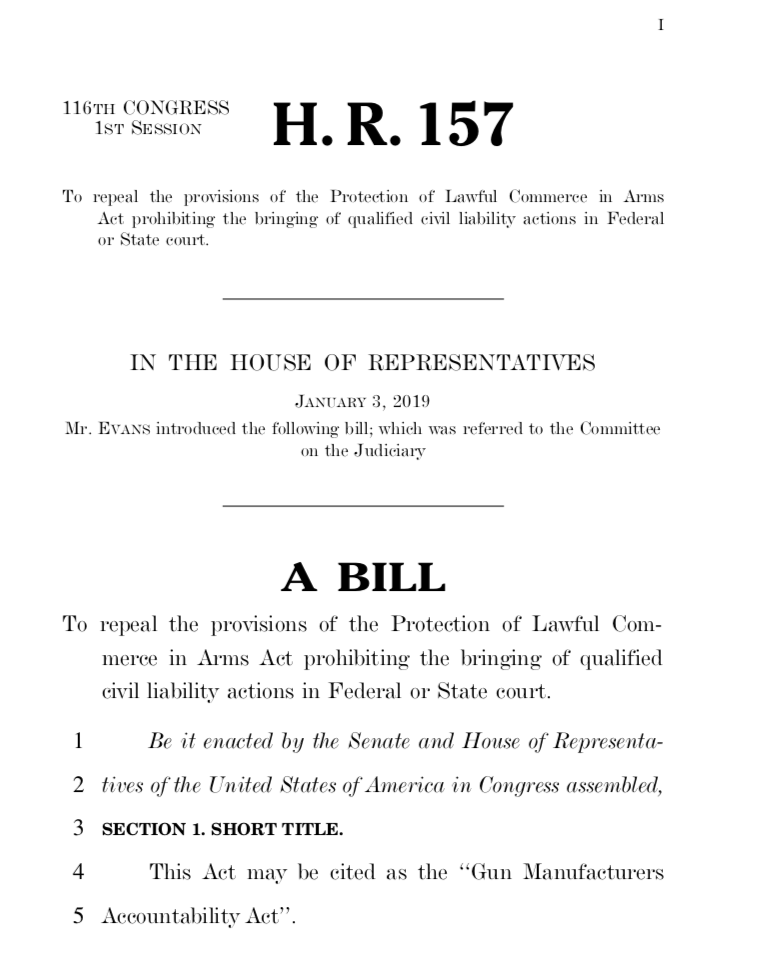Democrats — now in control of the House of Representatives and apparently assuming that gun control will sweep their party to victory at all levels in next year’s elections — have resurrected a plan to punish firearm manufacturers and retailers when individuals commit crimes with firearms.
The plan would single out firearm manufacturers and retailers for liability beyond what is typical in other industries — a fact ignored, of course, by the legislation’s proponents.

The debate over whether a manufacturer or a retailer of a lawful product should be held liable if a subsequent user of the item misuses it criminally or negligently is not new. Even prior to our independence from Great Britain, it was an established principle that individuals and businesses engaged in lawful commerce involving lawful products would be shielded from liability, unless the products were manufactured negligently or transferred under circumstances in which their misuse or abuse was known or reasonably foreseen.
That fundamental principle embodied in British common law has remained a cornerstone of American jurisprudence for decades. With few exceptions (largely resulting from the expansion of the regulatory state over the past century), the general rule protecting businesses against subsequent abuse of their products has held fast.
However, beginning in the 1990s, gun-control advocates launched a drive to change that long-standing principle of lawful commerce, as it applied to firearms. Individuals and organizations supportive of extensive gun control, including some funded by former New York Mayor Michael Bloomberg, sought out federal and state judges similarly predisposed, and began suing firearm manufacturers and retailers.
The costly legal actions (which put many “Mom and Pop” retailers out of business) sought to hold such businesses liable when criminals used guns those manufacturers had produced or that retailers had sold; even though the businesses complied with all applicable laws and regulations.
Notwithstanding that these gun control crusaders advocated a legal theory not asserted against other products that can be and are misused (such as automobiles), and ignoring the fact that firearms occupy a position unique in America in that they are expressly protected in the Constitution against government restriction, lawsuits against firearm companies whose products are abused by criminals have continued into the 21st century.
While this phenomenon is met with glee by anti-gun forces, the harm and expense it caused lawful businesses, and the precedent it set for attacking other dis-favored commercial products, finally woke the Congress to step in a declare such discriminatory application of the legal process to be at odds with our constitutional system.
In 2005, the Congress passed the “Protection of Lawful Commerce in Arms Act” (PLCA Act) which subsequently was signed into law by President George W. Bush.
Despite cries by gun control advocates that the law provided special and unwarranted protection to firearm manufacturers and retailers, the legislation simply made clear that such entities were to be treated no different from manufacturers and retailers of other lawful products.
In other words, if a company manufactured a gun negligently or one that failed to perform according to applicable standards, and someone was injured as a result, the manufacturer could be sued like the manufacturer of any other product. And if a retailer sold a gun under circumstances establishing that they knew or reasonably should have known that it would be misused, that retailer could be held similarly liable.
Simply put, the 2005 law gave to firearm manufacturers and retailers nothing more than the same protection from liability for misuse of their products as enjoyed by any other business. Still, resentment against the PLCA Act by the left simmered.
Now, in the lead-up to the 2020 elections, that simmering resentment has boiled over. Democratic presidential wannabes and their cohorts in the Congress have begun to clamor that protection for manufacturers must be repealed. Such a proposal, in conjunction with other ill-advised actions — like empowering the Centers for Disease Control and Prevention to consider gun violence a “disease” and gun control as the “cure” — will remain regular talking points for Democrat Party candidates at least through the November 2020 elections.
For the sake of constitutional principles and sound jurisprudence, let’s hope they remain nothing more than talking points.
Bob Barr represented Georgia’s 7th District in the House of Representatives from 1995-2003. He now practices law in Atlanta, Georgia and is Chairman of Liberty Guard (a non-profit, pro-liberty organization). He also heads the Law Enforcement Education Foundation (LEEF) and a consulting firm, Liberty Strategies. Originally published at Townhall.com.
